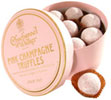 |
British Chocolate |
 |
As with German chocolate, British chocolate is quite under-rated.
This injustice is compounded by the fact that it was the British who invented solid chocolate in 1847.
Britain is a nation of chocoholics, second only to Switzerland, and companies like Cadbury's and Charbonnel et Walker do very well
feeding this addiction.
|
 |
 |
 |
 |
The Chocolate War
The Chocolate War refers to the dispute between Britain (and Ireland and Denmark) and eight
other European Union countries - Belgium, France, Italy, Spain, Luxembourg, Germany, Greece
and The Netherlands - over the sale of British Chocolate.
The dispute centred around the fact that British chocolate has a different recipe from other chocolate.
UK chocolate contains up to 5% vegetable fats. However chocolate 'purists' such as Belgium and France,
have long campaigned against vegetable oil use, believing that only only cocoa butter should be used in chocolate.
The British public and successive British governments stood resolutely against changing their chocolate.
For almost 30 years attempts to rename British chocolate (to Vegalate!!) or ban it outright were repeatedly and
successfully fought. The end result was that British Chocolate was effectively legalised for sale throughout the
European Union. As Labour Euro MP and consumer affairs spokesman Philip Whitehead said:
"It has taken nearly 30 years to be able to buy a Cadbury's Flake as easily in Madrid or Munich as in Manchester."
|
 |
The First Ever Chocolate Bar
In 1847, the Fry's chocolate factory, located in Bristol, England, molded the first ever chocolate bar suitable for widespread consumption.
The great-grandson of the original Joseph Fry discovered how to mix melted cocoa butter into defatted cocoa powder, along with sugar, to
create a paste that could be pressed into a mold. The resulting chocolate bar proved extremely popular.
|
 |
|
|
 |
Green & Blacks Organic Chocolate
Elizabeth Shaw Chocolate
Charbonnel et Walker Chocolate
|
 |
|
 |



